Does a restaurant selling alcohol create a pernicious environment for children?
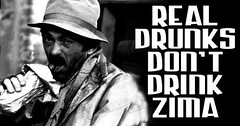
Modern Drunkard Magazine.
______
Update: also see this article from the Washington Post, "Request for Liquor License Uncorks Dispute," by Lyndsay Layton. WRT the School Board holding an emergency meeting to weigh in on this issue, no wonder the school system is in trouble. They aren't focusing on what really matters. A restaurant's peak hours of operation are from 7-10 pm. Uhh, schools aren't open then, are they? (Note that Alex Padro's comment in the story, that restaurants make 60% of their revenues from alcohol isn't correct, maybe 60% of net profit--alcohol is marked up 5 times, and food not usually more than 3-4 times. So a drink that costs $1 to make yields $4 in profit. It adds up. From the article:
Evans said that his bill would remove the automatic prohibition against a license but that the alcohol beverage control board would still be required to hold hearings and consider opposition.
What's the problem with that?
_______
Bill 16-696, which proposes to allow CR and CT sales (restaurant/tavern) of alcohol within 400 feet of schools, continues to raise hackles amongst some. Apparently, the School Board is trying to call an emergency meeting to pass a resolution on the issue, and it's still being discussed on the columbia_heights e-list. (I wrote about this last week.)
In response to William Jordan's rhetorical question, "It that because we no longer feel the need to offer special protection to these classes of persons and insititutions?," I would answer:
It is because the proscription chosen, for restaurants, has no impact +/- in terms of offering "special protection" wrt the sight of alcohol or inebriated people.
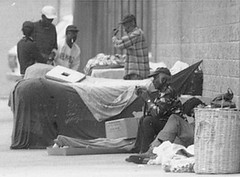
Skid Row in Los Angeles. Photo from the Weingart Center.
Restaurants are the issue here. Not package sales. Package sales tend to over-contribute to conditions in the public spaces that are deleterious to children. Yet the exception clause for Class A and B licensees--if a preexisting establishment exists, then the provision can't be enforced against others--means that in many instances this law is moot.
But it affects restaurants (CR, CT) even so, which are a different category, and again, have little if any impact on children. Technically, night clubs (places such as in Adams-Morgan) though raucous, also have little impact on children because their activities happen late at night/early in the morning.
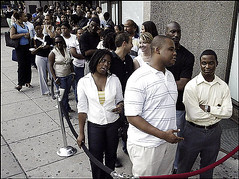
Queue the revelers: Steven Hargrove, front left, and Carl Biggs plot their Wednesdays to arrive early in line for the popular happy hour at MCCXXIII. (By Preston Keres -- The Washington Post). From "Drinking Up The Club Atmosphere."
For churches (not technically at issue), this is a non-starter. Most churches function only for about 3-5 hours/week, on Sunday mornings. Class A establishments are closed on Sundays. Class B sales start at noon. Restaurants serve alcohol in the morning, but it is quite limited.
The failure to make useful distinctions between Class A and B licenses vs. Class C licenses is one of the many failures in local political discourse. This catches us particularly in our mixed-use neighborhood commercial districts, which often include schools and religious institutions in the mix of uses.
Better to think about how to limit the impact of alcohol on children and work backwards in terms of thinking about and creating policies. In so doing, I can't imagine that restrictions on C licenses would have any impact whatsoever, or make the list of the top 10 or top 20 policies to work on bringing about.
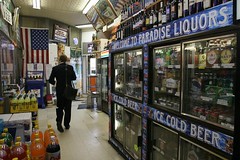
Paradise Liquors. Washington Post photo by Nikki Kahn.
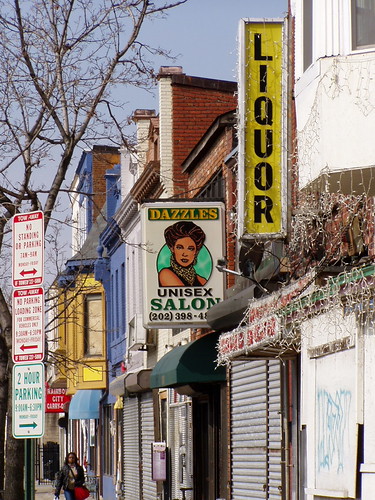
H Street NE. Flickr photo by Inked78.
Labels: restaurants, urban revitalization



0 Comments:
Post a Comment
<< Home